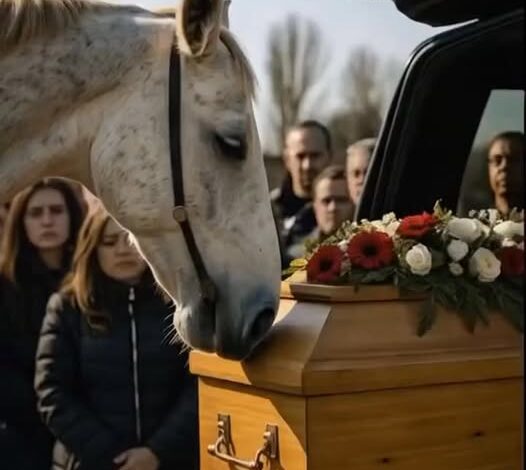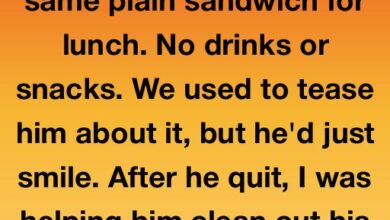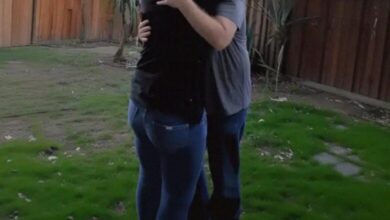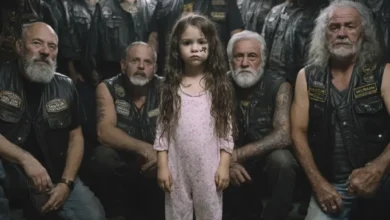
The White Horse at the Funeral, A Farewell So Deep It Reached the Heavens
The sky hung low that afternoon, gray and heavy, as if mourning with everyone gathered in the churchyard. A soft rain fell, steady and patient, soaking through umbrellas and dark coats. The scent of wet earth mingled with lilies and sorrow. It was the day the village said goodbye to Thomas Hale — a man not famous, not rich, but deeply loved.
Thomas had lived sixty quiet, steadfast years on his farm just beyond the hills. He was the sort of man who fixed broken fences without being asked, who left baskets of vegetables on doorsteps, who said little but meant everything he said. Yet for all his kindness toward people, his truest bond was not with a human being — it was with a white stallion named Storm.
Thomas had rescued the horse when it was just a terrified foal, abandoned and half-starved near the riverbank. Everyone said the animal was too wild to tame, but Thomas had a gift for patience. He’d fed it by hand, whispered to it, and taught it that trust didn’t have to hurt. Over the years, they became inseparable. Wherever Thomas went, Storm followed — down dirt roads, through fields, across the village square. The sight of man and horse side by side was as familiar as the sunrise.
When Thomas died suddenly of a heart attack, grief swept through the village. But it was Storm who took it the hardest.
He refused food. He kicked at his stall. Every night, he whinnied into the darkness, waiting for the sound of boots that would never come. The family tried everything — extra feed, soothing words, even leading him to the pasture he loved most — but Storm just stared toward the house, ears pricked, eyes searching.
The morning of the funeral, when the family came to check on him, his stall was empty. The gate hung open, hinges creaking. Somewhere in the mist, his hoofprints led into the woods.
They searched frantically, calling his name through the fog, but he was gone. They assumed he had wandered off in confusion, maybe chasing the only scent he could still recognize — his master’s.
By noon, the small countryside church was full. The rain pattered softly against stained glass. The priest’s voice echoed through the hall as he spoke about Thomas’s simple faith, his generosity, his quiet strength. Six men lifted the plain oak coffin covered in lilies and began carrying it toward the hearse. The sound of gravel crunching beneath their boots mixed with the low hum of prayer.
Then, cutting through the stillness, came a cry — long, raw, and haunting.
Every head turned.
From beyond the trees, faint at first, came the rhythm of hooves striking wet ground. Out of the mist emerged a white figure, glowing like something not entirely of this world.
It was Storm.
Gasps rippled through the crowd. The stallion’s mane was tangled, his coat slick with rain and mud. His flanks trembled with exhaustion, but his dark eyes burned with a single purpose. He walked slowly, deliberately, until he reached the coffin.
The pallbearers froze. The priest fell silent. For a long moment, no one moved.
Storm stopped beside the casket and lowered his head. Gently, almost reverently, he pressed his muzzle against the wood. The air grew thick with the sound of quiet sobbing.
No one spoke — they didn’t have to. The sight said everything.
Storm stayed like that for nearly a minute, unmoving except for the slow rise and fall of his breath. Then he made a soft sound — something between a sigh and a cry — and nudged the coffin, just as he had done every morning when Thomas brought him an apple.
That small, tender gesture broke whatever composure the mourners had left. Even the toughest farmers, men who had never cried in public, wiped their eyes. Mothers pulled their children closer. The priest looked away, his lips trembling.
“He came back to say goodbye,” someone whispered.
Storm lifted his head and let out a long, echoing whinny — a sound that seemed to pierce the clouds themselves. It was mournful, pure, and somehow final. When the hearse door closed, he stepped back, his gaze never leaving the coffin until it rolled out of sight.
After the service, as the others drifted away, Daniel, Thomas’s eldest son, found Storm still standing in the rain. The horse’s head hung low, raindrops sliding off his mane like tears.
“Come on, boy,” Daniel murmured, placing a hand on his neck. “He’s gone now.”
Storm didn’t move at first. Then, slowly, he pressed his muzzle against Daniel’s chest — a gesture of recognition, of shared loss. Together, they walked home.
That night, Storm stood outside his stable. He could have gone in, but he didn’t. Instead, he faced the open fields where he and Thomas had spent their lives — the same fields where he’d learned to run free under the man’s watchful eye. The moonlight caught his white coat, making him glow like a ghost. He stayed there until dawn, then lay down quietly in the grass.
Days passed. The farm felt hollow without Thomas. But every morning, at the exact time Thomas used to come feed him, Storm began his ritual. He would walk to the edge of the paddock, facing the hill where Thomas was buried. He’d stand motionless for several minutes — eyes fixed, ears forward — before turning back to his stall.
Rain or shine, he never missed a day.
Neighbors started noticing. Word spread through the village, and soon people came just to watch the white horse’s silent vigil. Some brought apples, others stood in prayer. It wasn’t spectacle — it was reverence. Storm’s devotion became a kind of living sermon about love that doesn’t need words.
The village priest wrote about it later in his journal:
“I have seen faith in many forms, but never anything as pure as that horse’s loyalty. Perhaps animals understand eternity better than we do.”
Months went by. The seasons changed. Then, one warm summer morning — exactly a year after Thomas’s death — Daniel found Storm lying beneath the oak tree that shaded his father’s grave. His eyes were closed, his breathing still. There was no struggle, no fear. Just peace.
Daniel knelt beside him and wept. He buried Storm right there, at the foot of the hill, beneath the same tree, under the same sky that had watched over them both.
The family marked the spot with a simple stone carved with the words:
“Together again — man and horse, heart to heart.”
Years later, villagers still speak of that day — of the white stallion who appeared through the mist to say goodbye, of the bond that not even death could sever.
On quiet spring mornings, when the fog rolls across the fields, some claim they can hear it still: the soft thud of hooves, the low murmur of a man’s voice carried on the wind.
They say it’s Thomas and Storm, side by side once more — proof that love, in its truest form, never ends.
Because some goodbyes are not goodbyes at all. They’re simply promises kept — across time, across silence, across the distance between earth and heaven.




